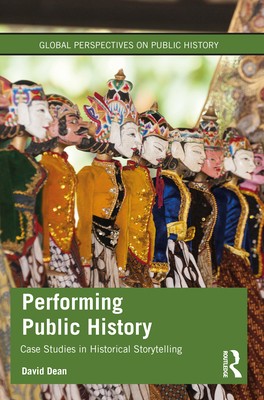
- We will send in 10–14 business days.
- Author: David Dean
- Publisher: Routledge
- ISBN-10: 0367775360
- ISBN-13: 9780367775360
- Format: 15.2 x 22.9 x 1.1 cm, minkšti viršeliai
- Language: English
- SAVE -10% with code: EXTRA
Reviews
Description
Performing Public History explores history-telling as a performance across a wide range of media including theatre and film, historical reenactments and living history performances, operas, and video games.
Taking historians as storytellers, this book illustrates how the choices they make shape historical meaning. While historians may strive to be objective when they research and write the past, they inevitably draw on their imagination, emotions, and creativity, aligning them with others who make history in public. The book explores issues such as the nature of archives, realism, fact and fiction, accuracy and authenticity, and actants and audiences. It draws on case studies from all parts of the world, offering global perspectives that invite a rethinking about what history is, and how and why we do it. Sharing work by graduate students, the author also offers an appendix of classroom exercises that instructors will find valuable.
Written accessibly for students, this volume offers a succinct account of the discipline of history, the field of public history, and how performance is a useful concept for thinking about history-work.
EXTRA 10 % discount with code: EXTRA
The promotion ends in 23d.06:52:23
The discount code is valid when purchasing from 10 €. Discounts do not stack.
- Author: David Dean
- Publisher: Routledge
- ISBN-10: 0367775360
- ISBN-13: 9780367775360
- Format: 15.2 x 22.9 x 1.1 cm, minkšti viršeliai
- Language: English English
Performing Public History explores history-telling as a performance across a wide range of media including theatre and film, historical reenactments and living history performances, operas, and video games.
Taking historians as storytellers, this book illustrates how the choices they make shape historical meaning. While historians may strive to be objective when they research and write the past, they inevitably draw on their imagination, emotions, and creativity, aligning them with others who make history in public. The book explores issues such as the nature of archives, realism, fact and fiction, accuracy and authenticity, and actants and audiences. It draws on case studies from all parts of the world, offering global perspectives that invite a rethinking about what history is, and how and why we do it. Sharing work by graduate students, the author also offers an appendix of classroom exercises that instructors will find valuable.
Written accessibly for students, this volume offers a succinct account of the discipline of history, the field of public history, and how performance is a useful concept for thinking about history-work.


Reviews